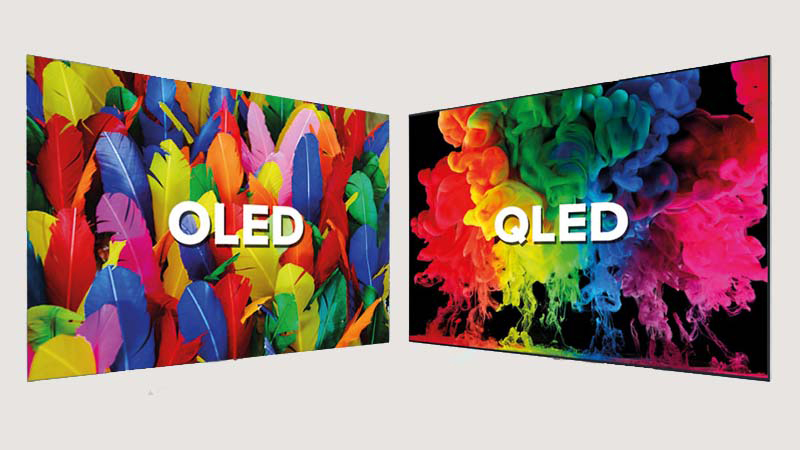
OLED vs. QLED: Which one to choose and why?
Choosing between OLED and QLED TVs can be a daunting task considering all the benefits and features of each technology. In this article, as TV experts, we'll take a closer look at the key differences between OLED and QLED to help you make an informed choice.
1. Display technology
OLED (Organic Light Emitting Diode)
OLED TVs use organic light-emitting diodes (OLEDs), which emit light on their own when electrical current is applied. This technology allows each pixel to light up individually, which provides a number of benefits:
- Deep Blacks: Because each pixel can be turned off completely, OLED TVs offer true blacks, which improves contrast.
- Thin Design: Without the need for additional backlighting, OLED panels can be extremely thin.
- Wide Viewing Angles:Colors and contrast remain consistent across multiple viewing angles.
QLED (Quantum Dot Light Emitting Diode)
QLED TVs developed by Samsung use quantum dots to improve color reproduction. These dots work in conjunction with backlighting, usually LED, to add brightness and richness to images:
- High Brightness: QLED TVs can achieve higher brightness than OLED, making them ideal for well-lit rooms.
- Durability: QLED technology is less susceptible to pixel burn-in, which can be an advantage for long-term use.
- Wide Color Gamut: Quantum dots allow a wider range of colors to be achieved, resulting in more realistic images.
2. Image quality
Contrast and black
OLED TVs offer unrivaled contrast thanks to the ability to turn off pixels completely, resulting in absolute blacks. QLED TVs achieve blacks by dimming the backlight, which can result in deeper blacks.
Brightness
QLED TVs have an advantage in brightness, making them more suitable for brightly lit rooms or for daytime use. OLED TVs, while offering excellent picture quality in dark environments, may be less bright than QLED.
Color rendering
Both technologies offer excellent color reproduction. QLED TVs can produce a wider range of colors thanks to quantum dots, but OLED also produces rich, accurate colors, especially in dark scenes.
3. Viewing angles
OLED TVs provide wider viewing angles without losing image quality. QLED TVs may experience slight color and contrast shifts when viewed at an angle, although modern models have greatly improved this aspect.
4. Response time and game support
Response time
OLED TVs have much faster pixel response times, which is especially important for fast-moving scenes in movies and video games. This minimizes motion blur and ensures clear images in fast-paced scenes.
Game support
Both technologies offer great features for gamers, including low input lag and support for high refresh rates. However, OLED TVs can provide a smoother gaming experience due to their fast response time.
5. Durability and pixel burn-in
Durability
QLED TVs are less susceptible to pixel burn-in and can have a longer lifespan under heavy use. This makes them an excellent choice for users who plan to use the TV for many years without degradation in picture quality.
Pixel burn-in
OLED TVs can suffer from pixel burn-in, especially if the same image is displayed for a long time. However, modern OLED models have greatly improved in this aspect and include technologies to minimize the risk of burn-in.
6. Cost
Price
OLED TVs tend to be more expensive than QLED TVs, especially for similar screen sizes. However, prices for OLED TVs are gradually coming down, making them more affordable for consumers.
Price-quality ratio
QLED TVs offer excellent value for money, especially for users who value high brightness and longevity.
Conclusion
The choice between OLED and QLED depends on your personal preferences and usage conditions. If you value deep blacks, slim designs, and wide viewing angles, OLED may be the best choice for you. If high brightness, longevity and a wide range of colors are important to you, QLED is a great choice.
By taking into account all of the above factors, you can make an informed choice and enjoy superior picture quality on your new TV.






